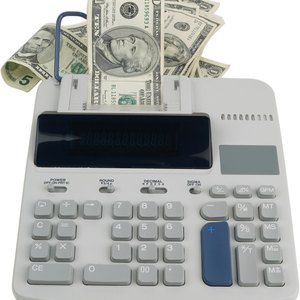
Savings accounts provide consumers flexibility in managing their cash. Savings account holders have the ability to accumulate cash and access it when needed -- unlike a CD or mutual fund -- all while earning interest on those funds. Because of this flexibility, savings accounts don't typically offer high interest rates. Consumers gain a much better return on other investments, like mutual funds and CDs, but without immediate access to those funds. However, consumers with several high balance accounts at one banking institution, namely a smaller local bank, may have the leverage to negotiate higher savings account interest rates. Banks, like most well-run businesses, tend to offer better incentives to their best customers.
Contact a few local or national banks to inquire about their savings account interest rates. Rates at other banks may be higher than the rates you are receiving from your current bank; this research will give you better insight into how your current rates compare with others. If you find that other banks offer higher interest than you are receiving on your savings account, make a note of these rates. You can use this information as leverage later when speaking to your bank's representative.
Contact your banking institution. Review your accounts and balances with a bank representative. This will ensure that the representative is aware of your personal account history with the bank. If you normally use a certain banker who is personally familiar with your accounts, ask to speak with her instead. This person is more apt to understand your relationship with the bank and the value of your accounts.
Ask for higher interest rates on your savings accounts. Tell the representative that you feel the high balance accounts you have just reviewed together warrant better interest rates than you are currently receiving. This is the time to mention the higher interest rates you discovered at other similar banking institutions. If the representative states that she doesn't have the authority to grant higher interest rates, ask to speak with someone who does. Mention, in a nonthreatening tone, that you are sure your bank's competitors would be happy to gain the high balance accounts that you currently have with the bank.
Tips
It may be difficult to ask for a specific interest rate as interest rates for savings account will vary greatly depending on several factors such as the banking institution, the account age and account balance. The best way to begin negotiations is to ask your bank's representative what is the best rate she is willing to offer on your high balance savings accounts.
References
- Fox Business: Five Easy Ways to Pump Up Savings
- Economy Watch: Interest from Savings
- Discover. "Online Savings Account." Accessed Oct. 27, 2020.
- SmartyPig. "SmartyPig Rates." Accessed Oct. 27, 2020.
- Affirm. "About Savings." Accessed Oct. 27, 2020.
- Live Oak Bank. "Business Savings Accounts." Accessed Oct. 27, 2020.
- Live Oak Bank. "Certificate of Deposit." Accessed Oct. 27, 2020.
- Alliant Credit Union. "High-Rate Savings." Accessed Oct. 27, 2020.
- Alliant Credit Union. "Kids Savings Accounts." Accessed Oct. 27, 2020.
- Alliant Credit Union. "Teen Checking." Accessed Oct. 27, 2020.
- Alliant Credit Union. "Credit Union Benefits, Join Us." Accessed Oct. 27, 2020.
- Simple. "High Yield Accounts." Accessed Oct. 27, 2020.
- Simple. "Frequently Asked Questions." Accessed Oct. 27, 2020.
- J.D. Power. "2020 U.S. Direct Banking Satisfaction Study." Accessed Oct. 27, 2020.
- Ally Bank. "Online Savings Account." Accessed Oct. 27, 2020.
- E*TRADE. "Online Banking Services." Accessed Oct. 27, 2020.
- Charles Schwab Bank. "High Yield Savings Account." Accessed Oct. 27, 2020.
Tips
- It may be difficult to ask for a specific interest rate as interest rates for savings account will vary greatly depending on several factors such as the banking institution, the account age and account balance. The best way to begin negotiations is to ask your bank's representative what is the best rate she is willing to offer on your high balance savings accounts.
Writer Bio
Rene Dale is a writer with more than a decade of financial services experience. She has worked in personal finance, mortgage lending, credit repair and financial analysis. Dale holds a Bachelor of Science in finance from the University of Tampa.

